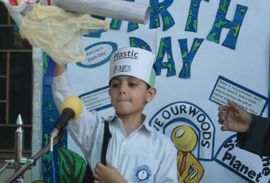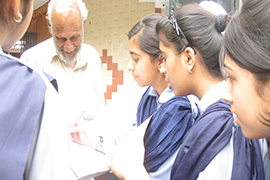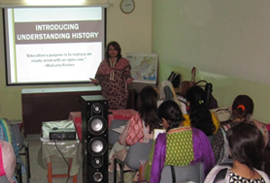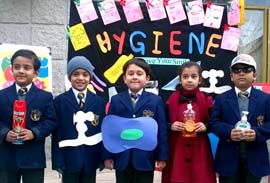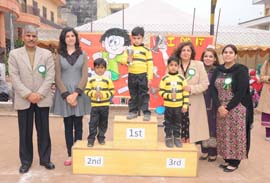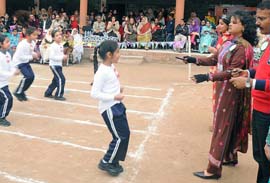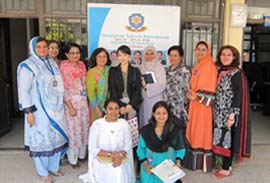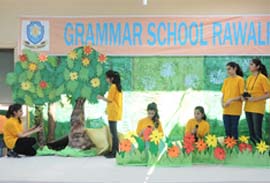Early Childhood Education (ECE)
GSR curriculum focuses on key developmental stages in children between the ages of three and five-years-old. Children focus on developing large muscles, fine motor and language skills. Besides literacy and numeracy children learn how to complete everyday activities, i.e. dressing, eating, social interactions. Children are engaged in activities such as singing, gardening, cooking, arts & crafts. They broaden their learning experience in their communities, through trips & special events.
Children are encouraged, to share & work cooperatively to explore the various stations in the Montessori classroom. Through cooperative play they learn to respect one another & build a sense of community.
GSR is sensitive to specific needs & abilities of children. They are allowed to learn at their own pace & on their own terms. Everything in the classroom is within reach of the child, & furniture is sized for children to sit comfortably.
Self-Discipline is a priority as at this stage it comes naturally to children. There are specific ‘ground rules’ for the class that are consistently enforced by the teacher & other students. This environment naturally teaches children self-discipline & it refines important skills like concentration, self-control & motivation.
When children are finished with an activity, they place items back into their appropriate places. This sense of order helps facilitate the learning process, teaches self-discipline & caters to a young child’s innate need for an orderly environment.
GSR’s ECE curriculum focuses on Hands-On Learning. One of the greatest benefits of the Montessori Method, particularly during the early learning experience, is the focus on hands-on learning. The emphasis is on concrete, rather than abstract learning, as students work on activities that teach language, math, culture & practical life lessons. Teachers encourage students to concentrate on tasks, & they discourage students from interrupting one another, allowing students to focus on activities until they are properly mastered.
Middle And Secondary Education
GSR offers curricula based on the educational needs of students within the requirement of the:
- Secondary School Certificate (Matriculation) of the Federal Board of Intermediate and Secondary Education (F.B.I.S.E.)
- General Certificate of Education (G.C.E. ‘O’ levels) of the University of London, United Kingdom.
GUIDANCE AND COUNSELLING
We attempt, at GSR, to help students in becoming wholesome and balanced individuals, comfortable with themselves and the world around them. To this end, Heads and teachers, with co-operation from parents, aim to resolve all issues that emerge, to create a conducive & satisfactory environment for each student at home & at school. Counselling for personal, emotional & social problems is sometimes dealt jointly by the parents & the school. When required, guidance can be provided in group form as there may be students who have more or less similar issues, on which they can be provided counseling in a group. If need be referrals can be made to professional experts.
TEACHING METHODOLOGY
GSR faculty members are aware that in order to fully meet a pupil’s needs, issues of individual teaching, learning styles and multiple intelligences should be addressed. They promote the integration of innovative technology, essential skills, values and attitudes across the curriculum.
Homework is an essential part of the curriculum & compulsory for all students. Family support of supervision for homework is crucial.
At GSR the development of academic and intellectual skills in students is achieved through:
- The school curriculum.
- The nature and quality of lesson planning.
- Strengthening of curricular content by appropriate interventions.
- Teaching strategies that are a diverse mix of recent innovations in education and which utilize:
- learner-based instruction.
- effective questioning techniques.
- project-based learning and teaching.
- co-curricular activities.
The focus of all the above is to create awareness & develop soft skills & appropriate attitudes in students & provide them with experiences that they can apply to real-life situations.
SCHOOL SCHEDULE AND TERMS
| In-house assessments. |
| Three assessments a year. |
| Three assessments OR two term examinations (along with mid-term tests) |
| Two term examinations (along with mid-term tests) |
| Two term examinations as well as a schedule of tests/examinations as determined by concerned co-ordinators. |
TEACHER'S DEVELOPMENT PROGRAMME
GSR’s INSETT Program, provides the teachers with the support mechanism involving a combination of face to face teacher training, with technology enhanced support.
Materials & activities are closely linked with the national curriculum & textbooks & reflect real life situations. Contents are developed to improve teacher’s subject knowledge & pedagogic skills.
GSR’s teacher development program, is responsible for, coordinating, developing and delivery of in service training sessions, annually.
Teachers attend workshops conducted by national & international trainers.
GSR’s TDP aims to:
- Inspire teachers to transform themselves through innovative teacher training modules.
- Improve teacher’s skills, knowledge and appropriate dispositions.
- Upgrade teacher’s capacity, on daily basis, in multiple ways, to build up their knowledge & analytical skills in a holistic manner.
- Introduce innovative classrooms activities.
- Build competent & committed teachers.
- Change the way children are taught, for better learning & self development outcomes.
CO-CURRICULAR ACTIVITIES
Personal & Social Education
GSR’s school calendar is packed with activities and competitions which have the primary focus of:
- Developing skills in students
- Honouring their abilities.
- Bringing out their latent talents.
- Allowing them to explore their interests.
- Providing them adequate exposure so as to broaden their minds and their horizons.
Some Of These Activities Are:
- Sports Days
- Commemoration of National and International Days
- Guest speakers
- Declamations and debates
- Quaid-i-Azam week
- Allama Iqbal week
- Fund-raising (for specific welfare causes)
- Environmental awareness through action
- Open Day presentations
- Field trips
- Music classes (which include our classical tradition)
- Art classes
- Classes in Education for Sustainable Development (including heritage, human rights, environment, responsible citizenship, etc.)
- Community service in literacy classes for disadvantaged children
- Class presentations
- School presentations at morning assemblies
- Film shows
- Mental Math contests
- Spelling Bees
- Kangaroo Math contests
- Map skills contests
- First Aid workshops
- Dramatics (with drama, role play and mime)
- Bait Bazi
- Haiku poetry writing
- Spring festival (with kite-making and flower arrangement competitions)
- Little Chef activities
- Community outreach



